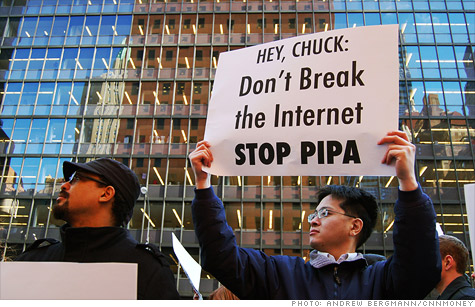
A SOPA protestor standing outside the Manhattan office of Sen. Charles Schumer, D-N.Y., on Jan. 20.
NEW YORK (CNNMoney) -- Two controversial anti-piracy bills, now effectively dead in the water, attracted enormous lobbying attention on both sides.
A total of 145 companies and organizations lobbied the House of Representatives for and against the Stop Online Piracy Act (SOPA), while 157 groups lobbied for and against its sister bill in the Senate, the Protect Intellectual Property Act (PIPA), according to the Center for Responsive Politics.
Comcast (CMCSA, Fortune 500), which supported both bills, was by far the biggest lobbyist, spending upwards of $5 million on the issue. In opposition to the bills, Google (GOOG, Fortune 500) was the largest lobbyist, spending about $4 million. Lobbying totals are only very rough estimates, because companies often include multiple bills and issues in their lobbying reports to Congress.
SOPA and PIPA were proposed bills that aimed to crack down on copyright infringement by restricting access to sites that hosted or facilitated the trading of pirated content.
Though opponents agreed that protecting content is a worthy goal, they argued that the way the bills were written effectively promoted censorship and were rife with the potential for unintended consequences.
The largest proponents came primarily from the commerce and media industries. Visa (V, Fortune 500) and Mastercard (MA, Fortune 500) spent several hundred thousand dollars, as did National Amusements, AT&T (T, Fortune 500), News Corp. (NWS) and Time Warner (TWX, Fortune 500), CNNMoney's parent company. The cable, motion picture and recording industry lobbies also spent heavily in support of the bills.
The opposition was headed by Internet companies like eBay (EBAY, Fortune 500), Yahoo (YHOO, Fortune 500), Amazon (AMZN, Fortune 500) and the Web's domain registry, the Internet Corporation for Assigned Names and Numbers.
But some unexpected names also lobbied Congress about SOPA and PIPA, including Tiffany (TIF), Ultimate Fighting Championship and Pepsi (PEP, Fortune 500). However, companies are not required to disclose whether they lobbied for or against a particular bill.
It was a tremendous lobbying effort on both sides, though it was not enough to crack the top-10 most-lobbied bills of 2011.
Interestingly, the lobbying effort may not have been what ultimately sealed the bills' fate. After a massive pushback from tech companies and their supporters in online and physical protests, both SOPA and PIPA were officially "postponed" on January 20. ![]()